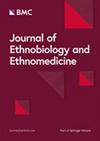我们是否将传统知识浪漫化了?呼吁开展更多民族生物学实验研究
IF 3.7
2区 医学
Q1 BIODIVERSITY CONSERVATION
引用次数: 0
摘要
在回答 "民族生物学是否将传统习俗浪漫化,迫切需要更多的实验研究来评估当地知识体系?"这一辩论问题时,我建议采用包容性的研究议程来跟进实地研究成果,并通过实验对描述性数据、理论和假设提出质疑。我建议采用包容性的研究议程跟进实地研究成果,并通过实验对描述性数据、理论和假设提出质疑。民族生物学家以及越来越多的利益相关者通常将传统知识和地方知识与积极的社会价值联系在一起。它们被视为改善当地生计、保护生物文化多样性和促进可持续发展的一种方式。因此,这些知识需要记录、保护、就地保存,并通过假设检验进行研究。在此,我认为在评估任何一种知识时,无论是现代知识、地方知识、土著知识还是传统知识,都需要有批判性思维。本文章由计算机程序翻译,如有差异,请以英文原文为准。
Are we romanticizing traditional knowledge? A plea for more experimental studies in ethnobiology
In answer to the debate question "Is ethnobiology romanticizing traditional practices, posing an urgent need for more experimental studies evaluating local knowledge systems?" I suggest to follow-up on field study results adopting an inclusive research agenda, and challenge descriptive data, theories, and hypotheses by means of experiments. Traditional and local knowledge are generally associated with positive societal values by ethnobiologists and, increasingly also by stakeholders. They are seen as a way for improving local livelihoods, biocultural diversity conservation and for promoting sustainable development. Therefore, it is argued that such knowledge needs to be documented, protected, conserved in situ, and investigated by hypothesis testing. Here I argue that a critical mindset is needed when assessing any kind of knowledge, whether it is modern, local, indigenous, or traditional.
求助全文
通过发布文献求助,成功后即可免费获取论文全文。
去求助
来源期刊

Journal of Ethnobiology and Ethnomedicine
PHARMACOLOGY & PHARMACY-
CiteScore
7.30
自引率
16.70%
发文量
66
审稿时长
>12 weeks
期刊介绍:
Journal of Ethnobiology and Ethnomedicine publishes original research focusing on cultural perceptions of nature and of human and animal health. Journal of Ethnobiology and Ethnomedicine invites research articles, reviews and commentaries concerning the investigations of the inextricable links between human societies and nature, food, and health. Specifically, the journal covers the following topics: ethnobotany, ethnomycology, ethnozoology, ethnoecology (including ethnopedology), ethnogastronomy, ethnomedicine, ethnoveterinary, as well as all related areas in environmental, nutritional, and medical anthropology.
Research focusing on the implications that the inclusion of humanistic, cultural, and social dimensions have in understanding the biological word is also welcome, as well as its potential projections in public health-centred, nutritional, and environmental policies.
 求助内容:
求助内容: 应助结果提醒方式:
应助结果提醒方式:


